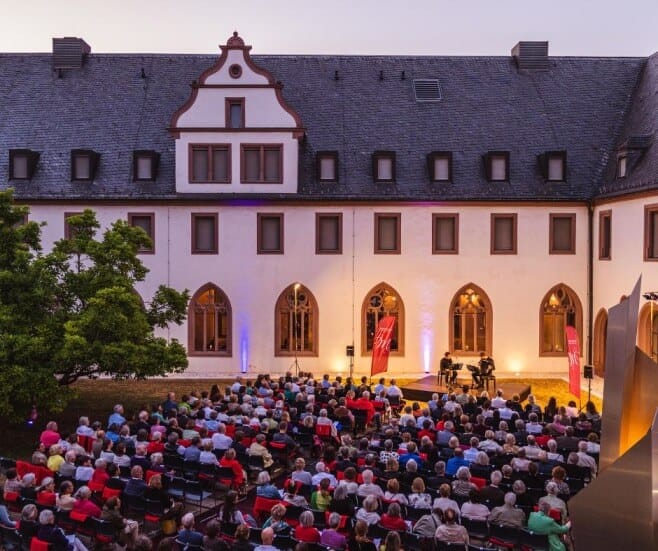A few days ago, we had the opportunity to perform in the enchanting courtyard of a castle located in the picturesque city of Würzburg, Germany. Our performance took place at a sold-out concert as part of the prestigious Mozartfest, and it was truly a memorable experience for both us as musicians and our enthusiastic audience.
If you’re curious to learn more about our concert and the impressions it left, you can read a detailed review of the event published by Fränkische Nachrichten, offering a comprehensive perspective on this memorable evening of music in Würzburg.
Im Vorhof des Himmels
Mozartfest-Intendantin Evelyn Meining brachte es auf den Punkt, als sie vor der Serenade im Exerzitienhaus Himmelspforten mit dem Duo Aliada von der beglückend-meditativen Atmosphäre im idyllischen Innenhof schwärmte.
Beste Voraussetzung also, um entspannt bei lebhaftem Vogelgezwitscher und zartem Insektengebrumm den Auftritt des Saxophonisten Michal Knot und des Akkordeonisten Bogdan Laketic zu genießen, die nach dem Motto „East West“ Originalkompositionen und Arrangements für ihre Instrumente von Bela Bartok bis Tomasz Skweres technisch brillant zu Gehör brachten. Es waren ungewöhnlich reizvolle Klangfarben eines Holzblas- und eines Tasteninstruments mit vollkommen unterschiedlichen Klangpaletten, für die sich auch Mozart – so Evelyn Meining – etwas hätte einfallen lassen, wenn es diese Musikinstrumente zu seiner Zeit schon gegeben hätte.
Zum Auftakt spielte das Duo eine Auswahl des „16 Walzer für Klavier Op.39“ von Johannes Brahms und kostete die Bandbreite zwischen einem eher behäbigen Ländler bis zum schwunghaften Walzer mit hörbarem Genuss aus. Tatsächlich hätte ein Brahms sich etwas für diese Instrumente einfallen lassen können, denn das Saxophon was schon erfunden und auch das Akkordeon, zumindest seine Vorläufer, gab es ebenfalls schon.
Das weitere Programm der Serenade vor der Pause mit Bela Bartoks Rumänischen Volkstänzen, einer Improvisation über eine Balkanmelodie von Vlastimir Pavlovic Carevac und mit „Polska fran Dorotea“ von Johan August Andersson offenbarte den eher runden und melodischen Klang des Saxophons gegenüber dem volleren und vielseitigen Klang des Akkordeons mit einer starken harmonischen Präsenz.
Die in Wien lebenden Künstler fanden seit der Gründung des Duos 2013 in der klassischen Musikwelt längst die verdiente Anerkennung, Bereits drei Jahre später wurden sie in das Förderprogramm „The New Austrian Sound of Music“ des österreichischen Außenministeriums aufgenommen.
Bekanntere Melodien gab es im zweiten Teil der Reise von Ost nach West, nachdem das Duo zunächst mit „Coffin Ship“ eine ihm gewidmete zeitgenössische Komposition des polnischen Komponisten und Cellisten Tomasz Skweres von 2018interpretierte, mit der die Bandbreite beider Instrumente klanglich spektakulär ausgeschöpft wurde. Viel Beifall fanden Aaron Copland „Three Moods“, eine Auswahl der „Children’s Songs“ von Chick Corea und Stücke aus George Gershwins „Song-Book“. Zum Abschluss fesselten Gerschwins Klavierstücke „Three Preludes“ mit Stilelementen des Jazz, gefolgt von einer kleinen Referenz an Mozart als Zugabe.
FRÄNKISCHE NACHRICHTEN (19.06.2023)
In the courtyard of heaven
Mozart Festival director Evelyn Meining got to the point when she enthused about the delightfully meditative atmosphere in the idyllic inner courtyard before the serenade in the Himmelspforten Retreat House with the Duo Aliada.
Best condition thus, in order to enjoy relaxed with lively bird twittering and tender insect buzzing the appearance of the Saxophonisten Michal Knot and the Akkordeonisten Bogdan Laketic, which brought original compositions and arrangements for their instruments of Bela Bartok to Tomasz Skweres technically brilliantly to hearing. These were unusually charming timbres of a woodwind and a keyboard instrument with various sound palettes, for which Mozart – according to Evelyn Meining – would also have come up with something, if these musical instruments had already existed in his time.
For the opening the duo played a selection of the “16 Waltzes for Piano Op.39” by Johannes Brahms and savored the range between a rather ponderous Ländler to a swinging waltz with audible pleasure. In fact, a Brahms could have come up with something for these instruments, because the saxophone what already invented and also the accordion, at least its precursors, also already existed.
The rest of the Serenade program before the intermission, featuring Bela Bartok’s Romanian Folk Dances, an improvisation on a Balkan melody by Vlastimir Pavlovic Carevac, and “Polska fran Dorotea” by Johan August Andersson, revealed the rather round and melodic sound of the saxophone versus the full and versatile sound of the accordion with a strong harmonic presence.
The Vienna-based artists have long since found well-deserved recognition in the classical music world since the duo’s inception in 2013; just three years later, they were accepted into the Austrian Foreign Ministry’s “The New Austrian Sound of Music” sponsorship program.
More familiar melodies were featured in the second part of the journey from East to West, after the duo first interpreted “Coffin Ship,” a 2018 contemporary composition by Polish composer and cellist Tomasz Skweres dedicated to them, which spectacularly exploited the range of both instruments in terms of sound. There was much applause for Aaron Copland’s “Three Moods,” a selection of Chick Corea’s “Children’s Songs,” and pieces from George Gershwin’s “Song-Book.” Finally, Gerschwin’s piano pieces “Three Preludes” with stylistic elements of jazz captivated the audience, followed by a small reference to Mozart as an encore.
FRÄNKISCHE NACHRICHTEN (19.06.2023)


